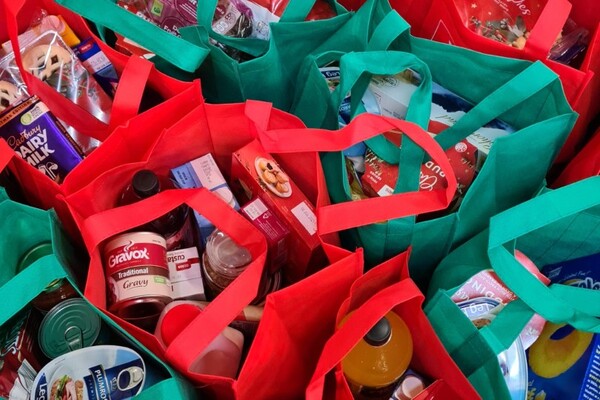One in 5 travel professionals may turn to food banks this winter, TTG survey finds
 Sophie Griffiths
Sophie GriffithsThe post-pandemic glow is rapidly being replaced by the prospect of a long, hard winter. TTG discovers how those in the travel trade are coping with the crisis.
One in five TTG readers believe they may have to use a food bank this winter.
This is the shocking statistic which lays bare the impact of the cost of living crisis on members of the travel industry.
While numerous travel headlines have discussed the squeeze on consumer finances and what it might mean for holiday purchases little has been mentioned on what it might mean for people working in travel, a sector left bruised and battered by the Covid crisis, and which – historically – hasn’t paid as well as other similarly skilled professions.
Now, as the cost of living crisis bites, a TTG survey exposes the immense pressures facing those working in this industry.
“I’m an apprentice earning less than £5 an hour… I’m very worried about affording bills”
Of the almost 200 people who took part in TTG’s anonymous survey, 4% of respondents confessed they have already been forced to use a food bank, while 19% said they have either “actively considered” or “may yet have to consider” using one this winter.
Meanwhile almost a third said they were considering taking on a second job in order to make ends meet.
Some 13% have already taken on a second position, largely due to the pandemic. Amongst reasons for taking on a second job, most said it was because they were worried about paying their energy bills.
While many are managing to scrape by without help, 68% still admit they have had to cut back on household essentials or groceries to save money in the past three months.
Asked if they had cut back on any other items, 78% of respondents said they had reduced spend on takeaways and eating out, followed by socialising (71%), Christmas gifts and celebrations (57%). Rather depressingly for the travel industry, 56% said they were also cutting back on personal holidays.
“My wages don’t even cover my rent so I am claiming universal credit"
Respondents also shared their salary brackets, with the majority (29%) earning £20,000 - £30,000, while the second highest majority (25%) report their annual income as £10,000 - £20,000.
According to the Joseph Rowntree Foundation, “a single person needs to earn £25,500 a year to reach a minimum acceptable standard of living in April 2022. A couple with two children needs to earn £43,400 between them.”
'I’m worried about affording the bills'
It is the anecdotal comments though, which perhaps demonstrate most sharply how people in travel are struggling. “I'm an apprentice earning less than £5 an hour… I’m very worried about affording bills,” said one.
“My wages don't even cover my rent so I am claiming universal credit. I pay my bills and have very little left so unable to do anything other than just survive,” said another.
“My daughter and I went three months without any hot water or heating. I was using food banks. By the end of August I couldn’t even afford to put fuel in my car.”
Other respondents speak of “cutting out lunches” and “working under blankets and with hot water bottles when it is cold”.
Numerous respondents said they were reliant on their partner’s salaries, and would have had to “wave goodbye to travel” without this. One person replied simply that they were currently feeling “utter despair”.
'You never know when your life is going to dissolve around you'
Trudie Clements, director of Abta LifeLine, said these bleak results “reflect what the charity is seeing”. She has seen a “huge jump” in applications since September, and paid out £10,000 in crisis grants in one week alone last month.
“People are worried about how they are going to pay their rent or mortgage, energy and put food on the table,” she said.
“Some are living hand to mouth, making choices whether to put the heating on or to eat, and living off credit cards. For others, those savings made by not commuting so regularly into the office have now been swallowed up by extra living costs.”
"Prior to April 2022 my electricity was £119 a month. Now it’s £279. I kept thinking to myself, 'I’ve worked so hard, I’ve paid so much tax and national insurance. How have I ended up here?'”
Clements is keen to stress that there is help available however, and one person all too aware of this is Claire (not her real name).
She worked for 33 years as a travel agent, store manager and even at a number of tour operators. Earlier in the year Claire fell on hard times due to personal circumstances, and although she was no longer working in travel, having worked for Abta members during her 33 years she was eligible for support from Abta LifeLine
“You never know when your life is going to dissolve around you,” she told TTG.
“My daughter and I went three months without any hot water or heating. I was using food banks. By the end of August I couldn’t even afford to put fuel in my car.”
LifeLine's support 'like winning the lottery'
Although Claire’s situation was triggered by a personal situation, she said the “cost of living crisis had a huge impact”.
“I couldn’t afford heating oil. Prior to April 2022 my electricity was £119 a month. Now it’s £279. I kept thinking to myself, I’ve worked so hard, I’ve paid so much tax and national insurance. How have I ended up here?”
After initially “burying my head in the sand” Claire decided to seek help and happened upon Abta LifeLine. The charity agreed to pay her rent and council tax arrears. “It wouldn’t seem a huge amount of money to some people but to me it was like winning the lottery.
“They gave me a literal lifeline and that’s something I will never ever forget. I’d hit rock bottom and their help lifted me - not just with the financial help but also through counselling support.”
"How do we adjust not just personally but as an industry to continue to support, retain and attract new talent?”
Claire has urged others experiencing financial worries to reach out to charities. “Don’t think ‘there’s no one there to support me.’ There are people that care and will support you.”
The Advantage Travel Partnership is also exploring ways to support members. Kelly Cookes, chief commercial officer, said the consortium was “looking at ways to help members maximise their income”.
She noted Advantage “at this stage we are not getting feedback that they will be taking additional jobs” but acknowledged “instead most are looking at ways to reduce costs where they can and also to diversify their businesses to attract new clients”.
Cookes added Advantage was also working on a profit protection plan offering members “practical advice on how to manage their businesses through what will be another challenging period”.
'A literal lifeline'
Some in travel have questioned whether national headlines are blowing the cost of living crisis out of proportion. But for Clements, the growing number of LifeLine applications is evidence of the many people in travel at least, who need help.
Clements is also worried by the long-term ramifications on the industry. “Everyone is making cutbacks and having to adjust to the new norm,” she said. “But there is uncertainty over how long this will last and whether we will ever go back to where we were before. If we don’t, how do we adjust not just personally but as an industry to continue to support, retain and attract new talent?”
For Claire, she will “never forget” the “literal lifeline” provided by the charity and is now working on how she can give back to others. On Christmas Day Claire will help out at a lunch for homeless people, “because that could be me… I just feel so lucky that it’s not.”
Here to help
On 13 December TTG Media will partner with Abta LifeLine and Citizens Advice to offer a free virtual session focused on providing advice on bills, benefits and budgeting.
Abta LifeLine's Spirit of Christmas appeal
Abta LifeLine is urging the travel industry to help fundraise for festive meals for 30 underprivileged families through its annual Christmas appeal.
LifeLine’s Spirit of Christmas fundraising drive is seeking to support industry colleagues “most in need” and experiencing hardship amid the winter cost of living crisis.
Firms can contact lifeline@abtalifeline.org.uk to pledge their help.
Where can you get support?
- Abta LifeLine – abtalifeline.org.uk/need-our-help
- Citizens Advice – citizensadvice.org.uk
- Samaritans – 24-hour support. Call 116 123 or email jo@samaritans.org
- National Debtline – Call 0808 808 4000 or use online advice tool at nationaldebtline.org
- Irish Travel Agents Association Benevolent Fund – itaabenevolentfund.com
- Association of Women Travel Executives Benevolent Fund – awte.org.uk/awte-benevolence
- Government advice – gov.uk/cost-of-living
- Mental health help – mind.org.uk
- General cost of living help – moneysavingexpert.com
Sign up for weekday travel news and analysis straight to your inbox

Sophie Griffiths
Supplier Directory
Find contacts for 260+ travel suppliers. Type name, company or destination.













